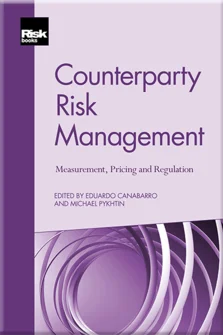Should Derivatives Dealers Make A Funding Value Adjustment?
John Hull and Alan White
The Basel III Enhancements to Counterparty Risk Capital Charges
The Regulation of Counterparty Risk in Over-the-Counter Derivatives Markets
The Non-Internal Model Method for Counterparty Credit Risk
On Credit Valuation Adjustments and Regulatory Capital
American Monte Carlo: A Practitioner Approach
Best Market Practice for Calculation and Reporting of Wrong-Way Risk
Central Counterparty Risk
CVA Risk Management Post-Crisis
Re-Thinking CVA: Valuations, Counterparty Credit Risk and Model Risk
Should Derivatives Dealers Make A Funding Value Adjustment?
Adjoint Algorithmic Differentiation: Real-Time Counterparty Credit Risk Management in Monte Carlo Simulations
Stress Test of Counterparty Risks and Dynamic Hedging of the CVA
Dynamic Stress Testing of Counterparty Default Risk
Collateral: Modelling, Pricing and Optimisation
 Many derivatives dealers believe that they should incorporate their funding costs into the determination of the fair value of derivatives. The resulting change in the value of the derivative is known as a funding value adjustment (FVA). In this chapter we shall present a sequence of arguments to show that a funding value adjustment should not be made. The value of a derivatives transaction, or portfolio of derivatives transactions, does depend on the credit risk of the two sides, but it should not depend on the funding costs of either side.
Many derivatives dealers believe that they should incorporate their funding costs into the determination of the fair value of derivatives. The resulting change in the value of the derivative is known as a funding value adjustment (FVA). In this chapter we shall present a sequence of arguments to show that a funding value adjustment should not be made. The value of a derivatives transaction, or portfolio of derivatives transactions, does depend on the credit risk of the two sides, but it should not depend on the funding costs of either side.
Hull and White (2012c,d) presented economic arguments that show that the adjustment should not be made. But, in practice, many dealers find these arguments unconvincing and choose to make the adjustment anyway (see, for example, Ernst & Young 2012). In this chapter we rely on arguments that are closer to the operations of the trading desk.
The theoretical valuation of a derivative nearly always involves an application of risk-neutral valuation. In this, expected cashflows are estimated in a risk-neutral world and discounted using a “risk-free” interest rate. The interest rate serves two purposes. It is used as the discount rate and it
Copyright Infopro Digital Limited. All rights reserved.
As outlined in our terms and conditions, https://www.infopro-digital.com/terms-and-conditions/subscriptions/ (point 2.4), printing is limited to a single copy.
If you would like to purchase additional rights please email info@risk.net
Copyright Infopro Digital Limited. All rights reserved.
You may share this content using our article tools. As outlined in our terms and conditions, https://www.infopro-digital.com/terms-and-conditions/subscriptions/ (clause 2.4), an Authorised User may only make one copy of the materials for their own personal use. You must also comply with the restrictions in clause 2.5.
If you would like to purchase additional rights please email info@risk.net











